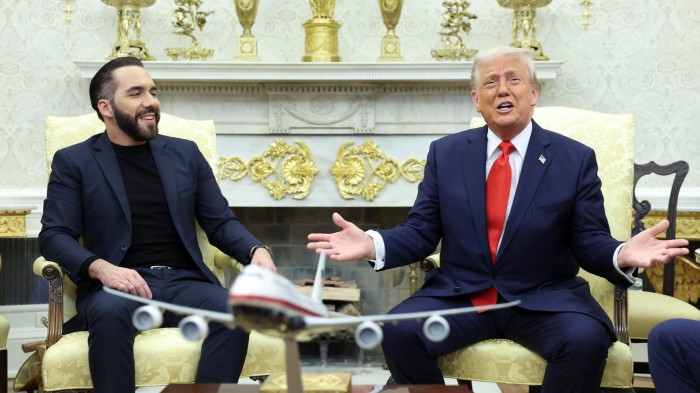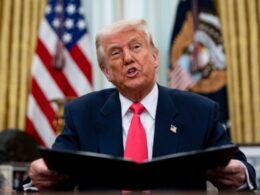Unlock the White House Watch newsletter for free
Your guide to what the 2024 US election means for Washington and the world
At around noon on 14 April, 2025, America ceased to have a law-abiding government. Some would argue that had already happened on 20 January, when Donald Trump was inaugurated. On Monday, however, Trump chose to ignore a 9-0 Supreme Court ruling to repatriate an illegally deported man. He even claimed the judges ruled in his favour. The US president’s middle finger to the court was echoed by his attorney-general, secretary of state, vice-president and El Salvador’s vigilante president Nayib Bukele. The latter is playing host to what resembles an embryonic US gulag.
In terms of clarifying moments, Trump’s meeting with Bukele compares with his dressing down of Ukraine’s Volodymyr Zelenskyy in late February. Zelenskyy was berated for being insufficiently thankful for US military aid and for failing to wear a suit. A tieless Bukele, by contrast, got royal treatment. Trump’s team nodded when Bukele said he would not consider returning the wrongly deported Kilmar Armando Abrego Garcia. All baselessly agreed that Garcia was in fact a terrorist. The Oval Office drama offered a civics lesson to the world: America’s government pays greater respect to a foreign strongman than its own Supreme Court.
Trump knows how to deliver gripping television. He was also making history. The official position of the world’s oldest constitutional republic is that the courts should have no say in who its executive deports and on what grounds. Foreign travellers to the US should beware. They can be detained without recourse. Americans should too. Trump casually told Bukele he may need to build more supermax jails for “homegrown” deportees, which means US citizens.
If Trump deems that you are a gang member, pro-terrorist, or simply anti-national, he claims impunity over your liberty. The fact that one deportee was a hairdresser, not a gang member, and another target was an innocuous op-ed writing student, not a terrorist, is no protection.
Trump’s lawyers are barely even pretending to phone it in. Evidence can be withheld on national security grounds or seemingly invented, as it was on Monday with Garcia. A government lawyer who conceded that Garcia’s deportation was mistaken was placed on administrative leave. Should the wrong person be deported in shackles, the US can do nothing about it. That would interfere with another country’s sovereignty, they say. This is from the same administration that is demanding other countries’ territory. El Salvador is as sovereign as Trump chooses it to be. Bukele is Trump’s hemispheric sidekick.
That the White House will not release details about its Bukele prison contract is also informative. Grift and authoritarianism go hand in hand. America’s busiest expos nowadays are those specialising in border security, drones and paramilitary gear. El Salvador is now a hotspot of shadowy vigilantism. In that respect, the US-El Salvador relationship is threatening to become two-way. Among those angling for deportation contracts are Erik Prince, the former chief executive of the mercenary group Blackwater.
The portents are also grim for US investors. On Monday, Morgan Stanley’s research arm warned they “should be prepared to be fooled many more times”. Analysts were referring to Trump’s constantly shifting rationale for tariffs. But their point — “Fool me once, shame on you . . . ” — also describes the US rule of law. Trump has pardoned several fraudsters and embezzlers who have contributed money to his campaign or just spoken well of him. He has also suspended a law that requires an entity’s true owner to be named, and another that penalises US companies for foreign bribery.
Now he is unleashing the investigative dogs on critics. The latest targets include a former federal official, Chris Krebs, for having “falsely . . . denied that the 2020 election was rigged and stolen”. The media is also in his sights. On Sunday Trump issued a torrent of threats against CBS for running interviews critical of him. He called on Brendan Carr, his chair of the Federal Communications Commission, to revoke the network’s broadcast licence.
The 60 Minutes interview that angered Trump was with Zelenskyy. Ukraine’s leader said that “Russian narratives are prevailing in the US”. That was a fair point given Trump’s reversal of culpability for Russia’s Ukraine invasion. But Zelenskyy’s observation can be applied more widely. In Russia, dissent can cost critics their business licences, liberty and even their lives. It seems a matter of time before other less besieged western legal systems hear petitions by US citizens for asylum.
Source link









